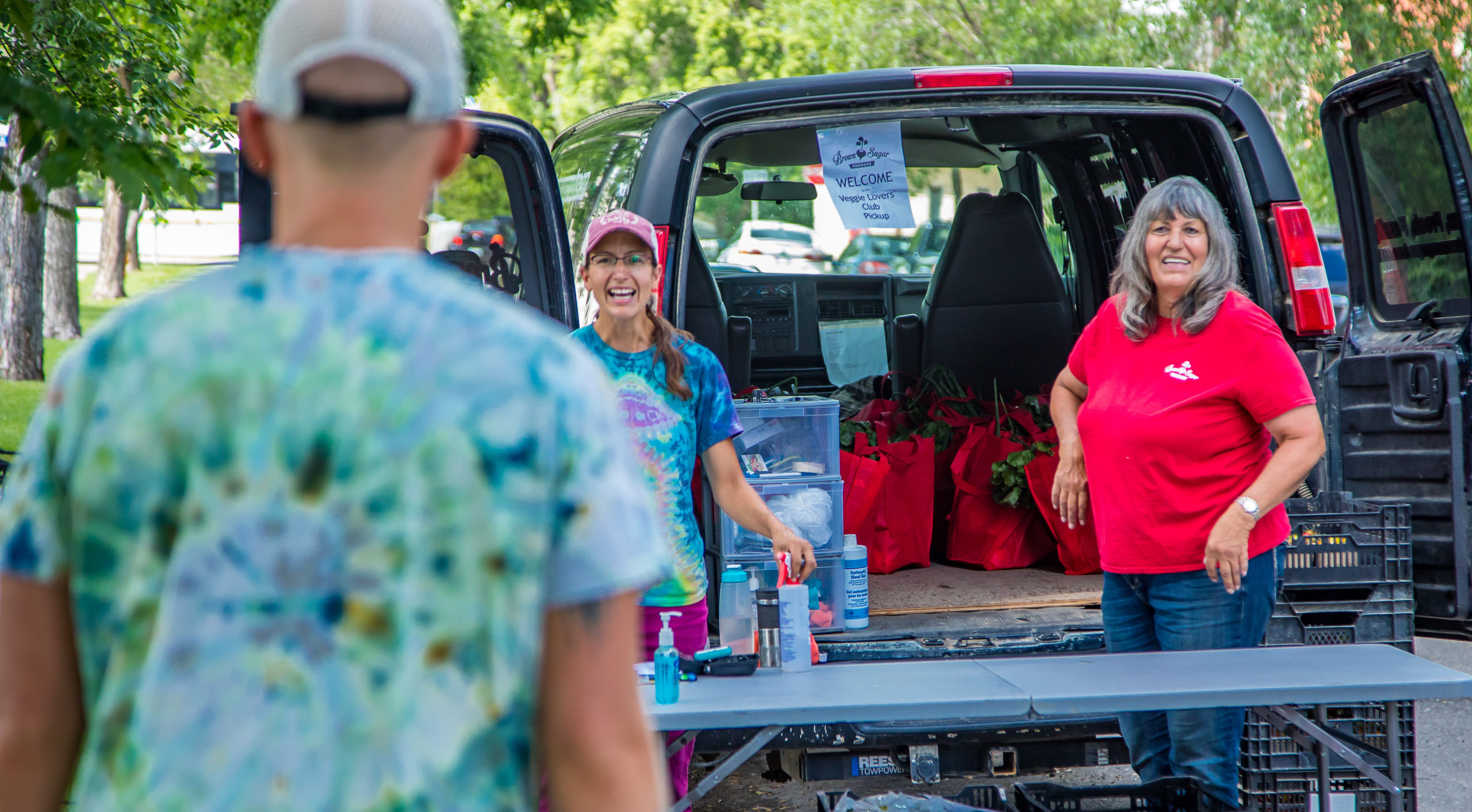by Teri Jenkins, Brown Sugar Produce
It’s easy to look at a small community and assume there are no opportunities to grow your business there. When I floated the idea of us moving back to my home province of Manitoba, my husband raised his eyebrows, wondering what sort of local market there would be for our small-scale veggies, grown with love? Thankfully we took a shot, and in fact, have found that there is lots of demand for our particular niche in my hometown. Small cities and towns, with their dense social networks, can be a great place to grow close relationships with your CSA customers. Those relationships help ensure the farm’s success and are a rewarding way to grow your market share.
When we moved here we joined my Mom’s business, which had a solid 15 year reputation and provided a strong foundation for our innovative ideas. In order to accommodate two additional full-time farmers, the farm had to increase its income and become more efficient. Our experience working at a large Community Supported Agriculture farm in the Maritimes encouraged us to adopt the CSA model. CSA is a direct marketing model where interested customers sign up before the growing season for a regular portion, or “share”, of the farm’s produce. Lynn Byczynski highlights in her book Market Farming Success, that the benefits of a CSA for the farmer “include getting a stable income, developing personal relationships with customers, contributing to the good of the community, and preserving farmland”.
We started with 60 members and after the first pickup deemed it a roaring success. Since then, it has continued to grow and two years ago we were able to add a second pick up location in Rivers, the community we live closest to. In fact, Rivers is so small it’s not even considered a town! According to Wikipedia, it’s “an unincorporated urban community in the Riverdale Municipality” with a population of only 1,257. Like many small communities, the residents have close social networks and so it only took a couple of dedicated supporters sharing about our program to their friends and family to create an opportunity for us. Our CSA program has fostered multi-year relationships with our best supporters, a community of veggie lovers within our local area.
In our lives we prioritize supporting those who support us. Those with seasonal CSA memberships include my dentist, accountant, mechanic, fellow farmers we buy food from, bookkeeper, and our refrigeration tech. These people are deeply invested in what we do because they are a part of it. It means a lot to me that my accountant eats what we produce and he understands our business more completely because he’s a participant in it. If our cooler breaks down in the middle of a market harvest day, our tech will be here within hours because he understands that it’s a critical point of the week- he’ll probably go home with a jar of Mom’s pickles as a tip! We believe the more people who are invested in seeing us succeed, the more supportive our community and the more stable our farm income.
One way we increase our CSA income is by making it convenient for CSA members to order additional veggies and complementary items from other farmers or producers. We keep our weekly bags the same 5 – 8 items for all members, in order to keep harvest, packing, and distribution simple and to allow some capacity for us to fulfill additional orders on pick up day. Our members can place additional orders online or via email to come with their CSA share. This helps them connect with what they want and get more value from a weekly stop that they are making anyway. Customers can order locally made items such as my Mom’s homemade pickles and preserves, Boho Soul Kombucha (Minnedosa) and Salad Dressing from Lady of the Lake Cafe (Brandon) that we keep in stock. I love that our members can support these other businesses directly through our farm. This year we are planning to use Local Line software for the first time to administer our online store.
There’s just nothing like having a weekly connection to other humans and getting to know them and their families- it means that the efforts of a small farm team like ours can be maximized. An important piece of weekly connection in our CSA is an email newsletter, which keeps our members informed and feeling like they are part of our farm. The communication I do to our CSA members is efficient so it’s easier to prioritize even though it’s work that you don’t immediately impact from, like hand weeding the carrots. In the past when our farm did wholesale I found that I spent way too much time administering and collecting orders from restaurant clients. We dropped that and gained more time for CSA, which turned out to be more sales volume, not to mention it keeps our CSA membership and farmers happier overall, too.
As Radha Agrawal notes in her community-building book Belong, “[a] community, like a garden, needs consistent nurturing and loving attention”. Nurturing our farm’s CSA relationships really is similar to stewarding healthy soil. Rather than looking outside of our existing operations for more markets, retail, or wholesale, over a relatively short time we have been able to grow our CSA membership – definitely our favourite part of what we do – to a level where it is the main income source on our farm. Through this process, we’ve been able to stay aligned with our values, hearts and our goals. To me this proves that you don’t need everyone to be your customer, you just need a small community of exceptional supporters willing to grow along with you.
